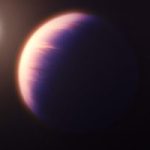Biography
Dr. Harrington began observing and modeling giant planets as an undergraduate at MIT. His pre-impact model of the collision of comet Shoemaker-Levy 9 with Jupiter in 1994, part of his MIT PhD thesis in planetary sciences, was published on the cover of Nature and sparked the worldwide media spree surrounding that event. Dr. Harrington then held a National Research Council Fellowship at the NASA Goddard Space Flight Center, during which he modeled the aftermath of the Shoemaker-Levy 9 impact and also identified the majority of planetary waves known on planets other than Earth. From 1997 – 2006, he worked as a staff scientist at Cornell University, where his interests shifted to observing extrasolar planets. He was part of the team that first measured light from an extrasolar planet, a result published in Nature in April 2005. He continued this work at UCF, first leading the Spitzer Exoplanet Target of Opportunity Program, which measured exoplanet eclipses and transits with the Spitzer Space Telescope, and then developing Bayesian Atmospheric Radiative Transfer (BART), an open-source, reproducible-research code for inferring (“retrieving”) the properties of exoplanet atmospheres from observations. He won the 2011 College of Sciences Excellence in Research Award for this work. In 2007-2010, he founded, funded, and led the team that documented NumPy and SciPy, the numerical packages for the Python language, now in use worldwide. In 2017-2018, he served on the National Academies committee that developed the approach NASA took in requiring that software developed under its science funding be open-source. A co-founder of the Planetary Sciences Track in the UCF Physics PhD program and the PhD in Planetary and Space Science, he developed and taught AST 6165 Planetary Atmospheres, AST 5765/4762 (Advanced) Astronomical Data Analysis, PHZ 3150 Introduction to Numerical Computing, and the gamified version of AST 2002 Astronomy. In 2020, he was named a UCF Pegasus Professor. He served as Chair of the UCF Faculty Senate and member of the UCF Board of Trustees in 2020-2022 and as UCF’s Interim Associate Vice President for Research and Scholarship in 2023-2025. He chairs the UCF Space Council.
Professor Harrington’s Research Web Site is here
Research Areas
Planetary and exoplanetary atmospheres.
Astronomical data analysis methodology.
Infrared observing techniques.
Open-source software and open science.
Keywords:
exoplanets
atmospheres
open science
computational data analysis
numerical modeling
observational astronomy
Research Opportunities for Students
Dr. Harrington is interested in exoplanet atmospheres, infrared observing techniques and instrumentation, data analysis methods, and open science. He is not currently taking new students. Read more about his research at: Joseph Harrington – UCF Planetary Sciences Group
Publications
Courses Taught
AST 5151 Fall 2025 – math module
AST 2002.0W61 Spring 2023 – the game version, first time taught at UCF



